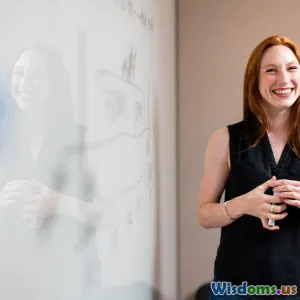
Preparing for Jobs That Did Not Exist Last Decade
15 min read Discover how to prepare for emerging careers that didn't exist a decade ago, driven by technology and innovation. (0 Reviews)
Preparing for Jobs That Did Not Exist Last Decade
Every era brings with it waves of innovation, but rarely have we seen such a rapid emergence of entirely new professions than in the last ten years. Dozens of job titles prevalent today—App Developer, Cloud Architect, Social Media Influencer, Data Ethicist, Drone Operator, and AI Prompt Engineer to name a few—were either barely known or didn’t exist a decade ago. The shifting landscape may seem intimidating, but it also opens extraordinary avenues for those willing to adapt and prepare proactively.
Understanding the New Job Frontier

Jobs disappearing and new ones surfacing is not unique to the 21st century. What sets the recent wave apart is its speed and breadth, powered by digital transformation, automation, and cultural shifts. According to the World Economic Forum, around 85% of jobs in 2030 haven't yet been invented. That stunning figure underscores a crucial reality: preparing for careers now means cultivating mindsets and skills suited for undefined, dynamic futures.
For example, the role of 'Esports Coach' has become significant with the booming global gaming industry, and 'Chief Happiness Officer' originated from rising HR priorities intersecting with tech-first companies. Ten years ago, wearable technology gave rise to new health data careers; more recently, AI advances opened opportunities for language model trainers and AI governance specialists. Each decade thus creates its career catalogue, marrying social needs with technological breakthroughs.
Future-Proof Skills: What to Focus On First

So how can you prepare for a job that doesn't even exist yet? Focus less on acquiring any single technical skill and more on fundamental abilities that translate across industries.
Adaptability and Lifelong Learning
A common trait among professionals thriving in novel fields is the willingness to learn and adapt. Coursera’s 2023 Global Skills Report highlights "ability to adapt to change" as one of the top three career skills valued worldwide.
Digital Literacy and Tech Fluency
Even non-technical roles increasingly require digital awareness. From financial planners using blockchain to marketers leveraging data analytics, understanding current technologies and digital trends is essential. For example, teachers have adapted to virtual learning environments with tools like Google Classroom and Zoom, roles which did not exist before the move to remote learning in 2020.
Creative Problem-Solving
When mapping unknown territory, there are few set procedures. Jobs such as Climate Resilience Officer or User Experience Designer thrive on solving open-ended problems with limited precedence.
Emotional Intelligence and Communication
Human-centric skills remain irreplaceable by automation. Consider Customer Success Managers, Social Media Community Managers, or Diversity Inclusion Specialists—roles that center empathy, communication, and relationship management.
Case Study: The Rise of the Influencer Economy

In 2010, 'influencer' was not a standard career path. Today, the creator economy drives over $100 billion globally, and platforms like TikTok or Instagram have formalized entirely new markets. The demand for jobs such as Video Content Strategist, Livestream Producer, or Meme Marketer now exemplifies how quickly the landscape can shift.
Influencers operate as entrepreneurs managing partnerships, content calendars, and monetization strategies. A 2022 report by SignalFire found an estimated 50 million people worldwide considering themselves creators, with millions earning sustainable incomes. To break into such fields, aspiring professionals often study digital marketing, storytelling, and branding—disciplines that barely existed in classical education models.
Gaining Experience in Undefined Fields

Traditional internships or corporate ladder climbing may not always apply when jobs are so new that clear entry paths don’t exist. Experience, however, can still be cultivated.
Participating in Hackathons and Innovation Contests
Skills competitions, hackathons, or idea festivals draw participants from diverse backgrounds. Events like NASA’s Space Apps Challenge or MIT’s Solve offer prospective professionals the chance to build real-world solutions in emerging fields—even if there’s no job description yet.
Volunteering in Tech Nonprofits or Startups
Early-stage organizations often blur traditional job titles, providing scope to experiment and lead beyond a single role. Example: Code.org or DataKind involve volunteers in AI, data analysis, and digital education, letting participants test-drive new skill sets in a practical context.
Pursuing Side Projects
'Passion projects' frequently seed real job opportunities. Consider indie game development, open-source software contributions, or launching a niche podcast. Employers in nascent industries often value a demonstrable portfolio over traditional resumes.
The Importance of Cross-Disciplinary Knowledge

The boundaries between industries are fading. Bioinformatics blends biology and data science; Legal Technologists combine law with programming knowledge. Harvard Business Review calls such “T-shaped professionals”—those with deep knowledge in one domain and broad skills across others—the most attractive hires for novel roles.
For example, autonomous vehicle companies require ethicists, engineers, sociologists, and urban planners to work side by side. The COVID-19 pandemic saw virologists partnering with software developers and behavioral economists, propelling the creation of health informatics jobs and pandemic modeling experts virtually overnight.
Actively seek experiences that cultivate breadth alongside depth:
- Pursue multidisciplinary coursework: Combine electives outside your primary specialty—an engineer with graphic design chops or a writer with a background in statistics.
- Engage in group projects: Collaborate with students or professionals from other fields to diversify your exposure and thinking style.
- Attend cross-industry conferences: Learn emerging best practices, network, and identify overlaps others might miss.
Renovating Traditional Education Models

The long cycle of academic curriculum updates means universities often lag behind fast-emerging roles. A LinkedIn report revealed that 57% of today’s skills will be obsolete within five years. Thus, learners are increasingly supplementing degrees with:
- Online courses and MOOCs: Platforms like Coursera, Udemy, and edX let people upskill on topics like cloud security or blockchain. For instance, the IBM Data Science Professional Certificate saw massive enrollments in developing nations hungry for digital job access.
- Microcredentials and digital badges: Companies such as Salesforce or Google run certification programs in new fields, from UX/UI to digital advertising. Digital badges offer proof of competence for roles lacking university equivalents.
- Short-term bootcamps: Intense programs cultivate job-ready skills in months, not years, and often pair learning with career support—think General Assembly’s immersive coding or DataCamp’s data analytics tracks.
Increasingly, employers see demonstrable project experience and practical problem-solving ability as better proxies of potential than formal degrees alone.
Industry Snapshots: Fastest-Emerging New Careers

To spotlight the breadth of transformation, here are five examples of job types that barely left a trace in employment statistics a decade ago, yet now represent real careers:
- Drone Operator/Analyst: Once reserved for military use, drones now enable land surveying, crop monitoring, and real estate marketing. The FAA forecasts over 310,000 commercial drones in U.S. skies by 2025, supporting new operator certification programs.
- AI Prompt Engineer: Many leading companies now hire specialists to design and optimize queries for generative AI systems. Since 2022, "prompt engineering" has moved from a niche to a recognized, high-paying field.
- Renewable Energy Consultant: The acceleration of the green economy—wind, solar, battery systems—created high demand for roles like solar installation designers or carbon offset strategists.
- Virtual Event Manager: The pandemic forced meetings and conferences online. A new generation of planners are experts in event tech stacks, digital attendee experiences, and livestream production.
- Digital Detox Coach: With screen time and digital burnout on the rise, wellness and productivity now includes guidance to unplug — a job title unheard of prior to the smartphone boom.
All of these underscore how rapid transformation puts a premium on curiosity and willingness to reinvent oneself.
Building a Personalized Action Plan

The future (and present) career marketplace offers both unpredictability and potential. To navigate this successfully, think beyond a single job or narrow degree path. Here’s a practical approach:
- Self-Assessment: Audit your current strengths and passions. Tools like the VIA Character Survey or StrengthsFinder can uncover aptitudes relevant in new industries.
- Trendwatching: Read industry forecasts, follow tech blogs, and subscribe to newsletters (such as MIT Tech Review or Gartner Hype Cycle) for early indicators of emerging skill needs.
- Network in Niche Communities: Join LinkedIn groups, Discord channels, or Slack communities focused on future-of-work dialogue. Engage with practitioners pushing boundaries.
- Experiment Safely: Try gig work, temporary projects, or remote freelance assignments to gain exposure to evolving job sectors without high commitment risk.
- Develop a Learning GPS: Build a curriculum for yourself. Balance foundational skills with targeted learning sprints when a new technology or model catches on.
- Stay Flexible: Be willing to pivot when new passions or promising fields emerge. The capacity to say "yes" to new opportunities is a competitive edge in a shapeshifting landscape.
Embracing Uncertainty as Career Advantage

Preparing for jobs that did not exist last decade is not just about technological enthusiasm—it is about mindset. Uncertainty, often viewed as intimidating, becomes a powerful asset when embraced. Adopting a growth mindset (as described by psychologist Carol Dweck) can transform risk into opportunity; those who see themselves as perpetual learners adapt as tools, platforms, and possibilities change around them.
Instead of fearing ambiguity, become skilled at navigating and even shaping it. Join trial programs, beta test new technologies, and get comfortable with making educated guesses. Remember: most current experts in fields like influencer marketing, digital wellness, or prompt engineering began as volunteers or hobbyists—and built expertise before formal roles materialized.
The Path Starts Now

The jobs of tomorrow will be built by those who dare to explore unknown frontiers today. By investing in adaptability, pursuing cross-disciplinary learning, and embracing both digital and human-centric skills, professionals at all stages can stay relevant—even as the world keeps changing at an unprecedented rate.
Prepare not for a single, fixed destination, but for the agility and resourcefulness to thrive in whatever field you create or discover next. The careers of the coming decade are unclaimed territory—ready to be shaped by those who move first.
Rate the Post
User Reviews
Other posts in Job Market Trends & Opportunities
Popular Posts















